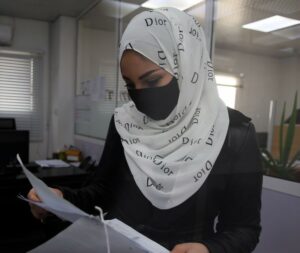In Jordan, just 14 per cent of women contribute to the national labour force, but Hanadi Osama has given much more than a mere statistic indicates. Osama simultaneously pursued higher education and decent work with good wages, despite obstacles. At times, personal circumstances and a contracting job market made this goal seem insurmountable, but Osama persevered.
Originally trained as a medical device and prosthetics engineer, Osama moved up the ranks at an apparel-manufacturing factory in Russeifa, from a position as a translator to assistant production manager. Now, she is managing around 275 workers.
Her journey up the professional ladder has not been a straight one. Osama has had to defy the odds, as an independent woman, to succeed in the Jordanian manufacturing industry.
“I lived with my family in Saudi Arabia, and returned alone to Jordan in 2011 to study in the university in Zarqa city, northeast of the Jordanian capital, Amman,” says Osama. Her family moved to Saudi Arabia for better living conditions when she was a child, but after high school, she returned to pursue higher education and start at a Jordanian university.
Osama attended the state-run Hashemite University, and found that she did well in her studies. Her father, who was a maintenance technician, paid 1,800 Jordanian dinars (around 2,500 US dollars, or 2,100 euros) for every semester.
Osama’s life changed when drastically when her father had an accident and subsequently suffered a stroke.
Overcoming Challenges
“With paralysis on the right side of his body, my father could not work anymore, and he returned to Jordan,” says Osama. Her father’s paralysis left him unable to contribute financially to her studies in engineering. Osama had to find work to pay her tuition and support her one-year-old son.
“I looked for a job to pay my tuition and rent costs. I worked at different places … as a saleswoman, a clothing shop assistant … but the wages were insufficient.”
Finding well-compensated work was a challenge for Osama, and unfortunately, her problem was not unique. The national estimate of unemployment for women is around 33 per cent, compared to about 21 per cent for men. These high unemployment rates contribute to an unstable job market and lower wages.
“I had to postpone semesters,” she says, “and it took me eight years to graduate. In my final year at university, I borrowed 3,700 dinars from a women’s fund to complete the year.” Osama could not satisfy her lab requirements and work simultaneously, so she decided to alternate: working one semester to pay the next semester’s tuition.
After graduating with a degree in Biomedical Engineering, she was finally able to find stable work. Osama joined a factory in the Russeifa area, between Zarqa and Amman.
“I was appointed as a translator to assist an executive who was training Jordanian female workers.” She is fluent in both Arabic and English.
The labour market inclusion of women in Jordan, which remains amongst the lowest in the world, is in contrast with education outcomes in the country, with women representing 53 per cent of university graduates, according to the International Labour Organization (ILO). Jordanian women are some of the best-educated in the region.

The Winding Road to Success
After three months at the factory, a member of the Better Work Jordan programme, Osama had gained the trust of her superiors. She was eager to sign up for additional training programmes, and she joined the Personal Advancement and Career Enhancement (PACE) programme, developed in partnership by Better Work Jordan and Gap, Inc. This helped her develop the technical and leadership skills to progress.
“I was named supervisor in the production division,” she says. “I gained experience and conducted a study with a plan on how to develop work and make it more efficient, including analysing stages of clothing production, machinery and their problems, and types of threads and strings.”
Fortunately, “Management liked the plan.”
Encouraged by the experience, Osama later enrolled in a three-month training programme on industrial engineering.
“I joined the industrial engineering division, and I got additional training on finished products, factory management systems, and capacity building.” Osama shined in the programme and was eager to become a trainer herself.
“I was also trained by the ILO on self-advancement and career enhancement. I became a trainer on the same training course,” she says.
Not long after, Osama was promoted to assistant production manager. Now, she works to oversee other workers and help them find their paths, as she has. Osama’s outlook on her own life has also evolved.
“My occupational responsibilities and duties developed, with a pay raise. My self-confidence was boosted,” she says. “I believe more in my abilities and skills, and now I have a more effective role within my family.” Osama has gone from being supported by her father to taking up the responsibility of helping financially support her family. This is a source of considerable pride, but it is not easy.
Osama lives in a neighbourhood close to the factory, where she works around 60 hours a week, as her sisters take care of her son, Osaid. It is a difficult trade-off, but with this arrangement, Osama hopes that Osaid will also be able to build a successful, self-reliant life… like his mother.